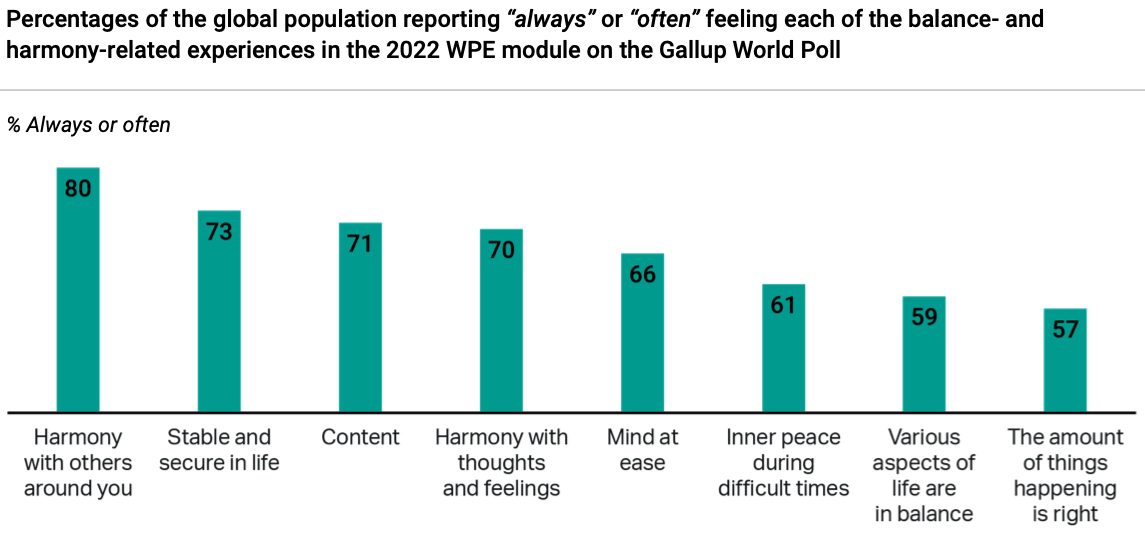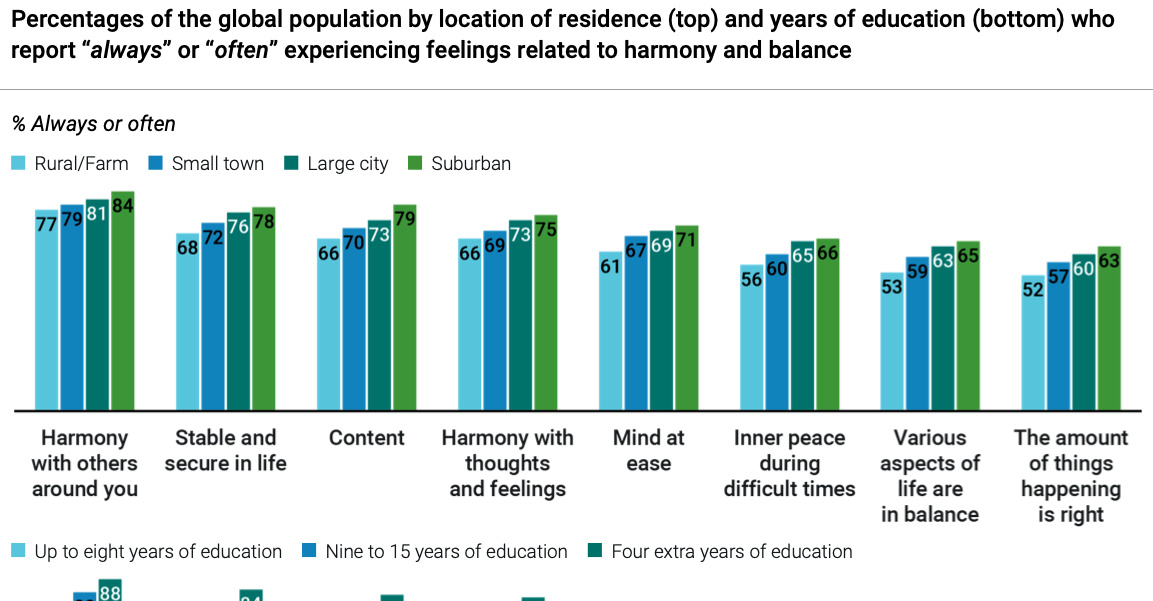A 2022 global survey conducted by Gallup and the Wellbeing for Planet Earth Foundation found that a significant majority of the world’s population regularly experiences feelings of contentment, community, and other aspects of well-being. Approximately 80% of respondents “always or often” experience harmony with others, and at least 70% experience feelings of stability, security, and integration between thoughts and feelings. However, the study reveals that finding balance in life is more challenging, with only 59% reporting that various aspects of their lives are in balance and 57% feeling that the amount of things happening in their lives is just right.

Judy Skeen, a religion professor and spiritual director, highlights that well-being is linked to a sense of purpose, belonging, and balance. A significant obstacle to achieving balance is the aversion to limitations, particularly in Western societies. The study also emphasizes the impact of socioeconomic background on individual well-being, with those with minimal education and those struggling to live on their current income experiencing these well-being principles less frequently.
The survey found that in North America, Australia, and New Zealand, 90% of residents often feel harmony with others, but these percentages decrease when it comes to peace of mind and having the right amount of things happening in life. This study underscores that financial wealth alone cannot guarantee well-being and suggests that Western societies are increasingly struggling to pay attention to their lives despite economic success and leisure time.
The study shows that violent conflict and location of residence can influence well-being, with conflict and war disrupting people’s sense of internal balance and harmony. Suburban dwellers reported the highest levels of well-being across various categories, while rural residents reported the lowest levels. Skeen emphasizes the importance of achieving cohesion between inner and outer lives for a harmonious balance in well-being.
Baptist News Global further reports:
“We are losing the ability to pay attention to our lives in the Western world. By economic standards, we are more successful than ever, we have more leisure time than ever, but we are also less happy than ever,” researchers reported.
Anna Lembke’s book, Dopamine Nation: Finding Balance in the Age of Indulgence, captures this dilemma well by describing how addictions to things such as food, gaming, shopping, Facebooking and drugs result from a desperate-but-futile search for harmony and peace, Skeen said.
“It can be our phones, too, or anything that distracts us from what’s really happening in our lives. So many people are searching for ways out of spiritual and emotional poverty in the midst of economic plenty.”
Researchers said violent conflict and location of residence also influenced well-being measures around the world.
“Conflict and war can disrupt people’s sense of internal balance and harmony.”
“When examining country-specific data on balance and harmo
ny, an unsurprising pattern emerges: Conflict and war can disrupt people’s sense of internal balance and harmony,” the report explains. “This point is exemplified by the fact that three countries that consistently rank among the bottom 10 countries in terms of the frequency of reported balance and harmony in 2022 are Afghanistan, Azerbaijan and Sierra Leone.”
In Afghanistan, the repressive Taliban regime is engaged in constant fighting with rebel groups, while Azerbaijani troops frequently clash with an Armenian-majority republic. In Sierra Leone, police and military units use violence against demonstrators.
Whether respondents lived in small towns, large cities or in suburban areas also affected survey results. Suburban dwellers reported the highest levels in each category, including harmony with others (84%), stable life (78%) and inner peace in difficult times (66%). Rural residents reported the lowest levels in each category, including harmony with others (77%), stable life (68%) and inner peace (56%).
Skeen said the work she does as a facilitator with the Center for Courage and Renewal often centers around helping clients find a harmonious balance between all the moving parts of their lives.
“It’s about our inner lives and our outer lives having cohesion,” she explained. “Those with next to nothing are often living in harmony and balance, and they don’t have the need to have more and more and more to find it.”
Read the full article.









